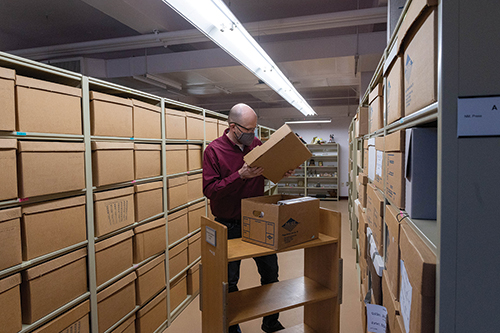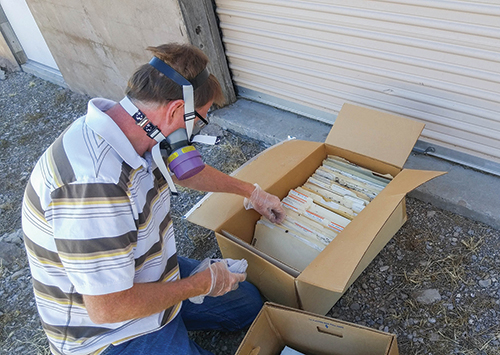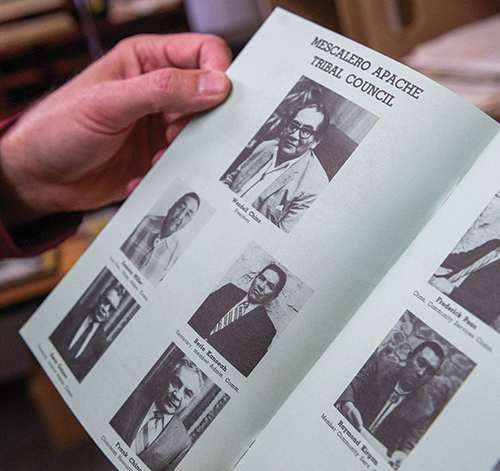Mark Chino ’76 knew he faced a monumental task – one best given to the professionals at NMSU. When his father died in late 1998, Mark Chino inherited numerous materials and papers that detailed the life and work of Wendell Chino, who was a longtime president of the Mescalero Apache Tribe.
“He knew what he wanted to do for his people,” Mark Chino says. “All of the efforts he made during his lifetime were directed toward that objective.”
After years of thought, Mark Chino and his wife, Selena, decided to donate the Wendell Chino papers to NMSU’s Archives and Special Collections in 2017. Wendell Chino is considered one of the most influential Native American leaders of the 20th century.
“The collections in the NMSU Library Archives provide resources of substantial depth on the history and cultural heritage of southern New Mexico that can be found nowhere else,” says Dennis Daily, NMSU Archives and Special Collections department head. “We have a responsibility to ensure that our collections represent the experiences and points of view of all those who have called this region home. The Wendell Chino papers provide an important perspective on the history and development of the region from the Mescalero Apache viewpoint.”
The collection, which is now part of the Archives and Special Collections political papers, consisted of 93 boxes of materials documenting the time Wendell Chino spent focusing on the needs of the Mescalero Apache Tribe in areas such as education and career training, healthcare, housing, support for the elderly, public safety, infrastructure development and tribal courts.
“Looking through the countless boxes of materials and pictures and newspaper articles, the thing that surprised me the most was the depth and breadth of issues he was involved in,” says Mark Chino, who was a young child during the early years of Wendell Chino’s tenure.
“The collection will be of great interest to scholars looking into Indigenous rights and self-governance during the pivotal decades of the mid-20th century,” Daily says.
“The decision to donate archival material, particularly those of a family member, can often be angst-ridden as donors have a direct emotional connection to the papers,” says Dylan McDonald, NMSU political papers archivists and special collections librarian. “Mark and Selena recognize that Wendell’s speeches, correspondence, files and photographs are of immense interest to others besides themselves. To ensure that others have access to the papers, they have placed great trust in the library to preserve, care for and make available the thousands of items that give insight into Wendell’s life.
“As archivists process personal papers, they are granted a unique view into a person’s life,” McDonald says. “In this case, while Chino spoke, wrote and testified very powerfully and persuasively on Indigenous autonomy – often very publicly – it’s the private correspondence he carried on with national political figures and Indigenous leaders that really grabbed my attention.”
During Wendell Chino’s tenure, the Mescalero Apache Tribe built the Inn of the Mountain Gods Resort and Casino, schools, a hospital, a health center, a timber mill and a metal fabrication plant.
Work to fully organize, describe and publicize the collection is ongoing but it is available now for researchers to use in the archives in Branson Library.
“Collections like the Wendell Chino papers bring scholars from across the country, and even outside the U.S., to NMSU to conduct their research, enhancing the university’s reputation as a unique Southwestern and border-region research institute,” Daily says.
“A lot of these materials, whether they be my dad’s stuff or anybody’s, they are one-of-a-kind that can’t be duplicated,” Mark Chino says.
“Placing the papers at NMSU also shows Mark and Selena’s support of the university and library’s mission, which is to provide a setting for scholarship, training and education for all the citizens of New Mexico,” McDonald says. “This donation speaks to their desire to provide the students of NMSU with a world-class educational experience.”
To read more about the Wendell Chino papers visit openstacks.nmsu.edu/the-wendell-chino-papers.




Dove Hall, Room 212
305 N. Horseshoe Drive
Las Cruces, NM 88003